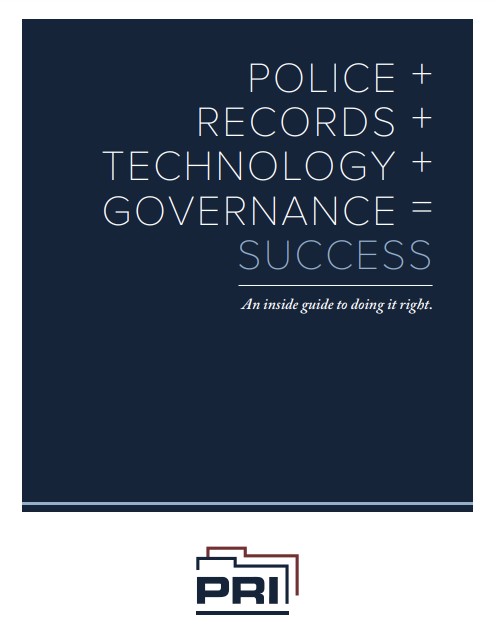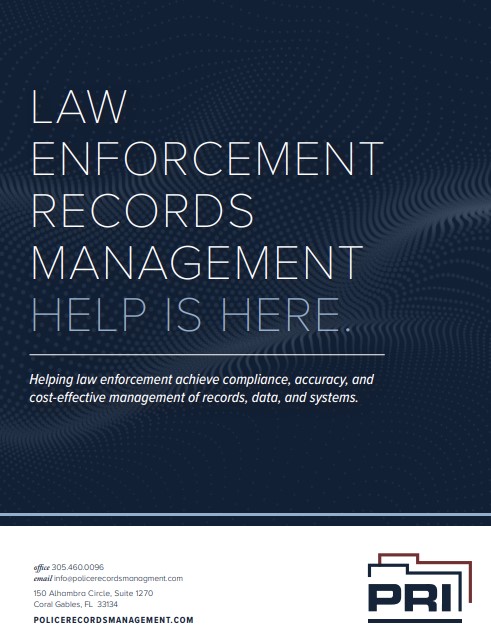Your story is one we understand. We can assure you, you’re not alone.
The job of records management is more important than most who work in law enforcement realize. Information is the lifeblood of the agency. When mismanaged, records and data impede the success of its mission, whether it be public safety, community relations, or reform. The correctness of information in law enforcement can mean the difference between one’s freedom, or arrest, obtaining justice, or letting a suspect go free, the ability to get a job, or remain unemployed, and even life, or death.
The efficacy of the information so often used to form such mission, and compliance-driven decisions, is contingent upon how well the agency manages its records and data. This is where the trouble can start.
While the exponential growth of the types and volume of such information has placed the issue of storage, cost, and access at the center of the discussion, all too often something is missing from the equation. From the vast amount of digital evidence requiring management, to changing crime data standards used to target crime, to the massive volume of video produced today, law enforcement is facing an imperative to modernize its approach to information management.
“Law enforcement must meet the imperative, and begin to arm their personnel with actionable information that can be used reliably, and reduce the risks and costs incurred when the right technology is obtained, but the wrong approaches to managing information remain.“
There are 18,000 police agencies in America, over 4500 of which are customers of PRI. While the technology exists to help manage the inundation of information, to this day, nearly a quarter of the way through the 21st century, agencies by and large continue to utilize information management approaches of yesteryear.
The information-driven decisions of today require police records and data to be accurate, error-free, and timely; absent of incorrect information. Errors lead to mistakes. Mistakes in decisions have consequences. In law enforcement, they can be consequential.
What follows then is an imperative that logically suggests the paradigm shift in focus on storage, costs, and integrated accessibility, must not leave out the matter of efficacy. As the volume increases, so too does the risk of misinformation. This imperative presents a challenge. Consider the following:
- Proper, efficient, cost-effective management of digital evidence begins with retention. This is a systemic issue in law enforcement, where the majority of agencies neglect retention schedules, keep records (electronic and paper) for far too long, and migrate everything from old systems to new ones, bad data and all. Costs go up, quality goes down.
- Technology project failures are common. The neglect to include end-users and records managers in the selection and implementation of new CAD/RMS/DEMS applications leaves them with a system that comes as a surprise. These projects naturally fall apart, including multi-agency consortiums which have disbanded, leaving the host agency to foot the bill.
- System operability must meet the diverse needs of officers, dispatchers, records, command, and crime analysis personnel. When it doesn’t, user adoption is low, failing to provide a return on investment, sometimes leading to system replacement in just a few short years. Ask around and you will hear. It happens more often than you might think.
- Records managers often operate in less-than-ideal conditions. They are faced with enormous responsibility yet siloed in outdated procedures, absent policy, lack of training, insufficient staffing, and a pervasive and destructive cultural divide which often identifies them as “civilians” who serve a far less important role than “sworn” personnel. To the contrary, they serve a critical role, and deserve to be recognized accordingly.
Law enforcement must meet the imperative, and begin to arm their personnel with actionable information that can be used reliably, and reduce the risks and costs incurred when the right technology is obtained, but the wrong approaches to managing information remain.
From broken workflows, data duplication, failed retention, and outdated or absent policy, the job requires much more than it used to. It’s not just records management. Its business process re-engineering, strategy, risk management, training, systems integration, and leadership.
From building better business process, eliminating duplicate records, and staying ahead of the technology curve, the job is protecting the agency and providing public safety, together.
Your story is ours to understand. Your goals are our mission. Your frustrations are ours to eliminate. Your stress is ours to reduce. Your needs are ours to meet. We walk with our customers along the journey. We’re here to help.
“Your story is ours to understand. Your goals are our mission. Your frustrations are ours to eliminate. Your stress is ours to reduce. Your needs are ours to meet. We walk with our customers along the journey. We’re here to help.”





